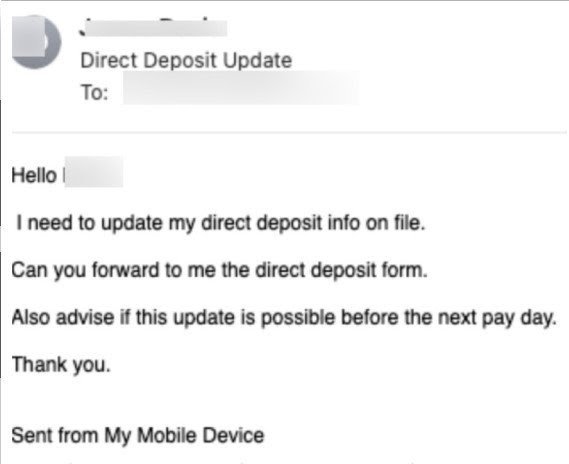DocuSign phishing campaign targets low-ranking employees
Phishing actors are following a new trend of targeting non-executive employees but who still have access to valuable areas within an organization.
As reported by Avanan researchers, half of all phishing emails they analyzed in recent months impersonated non-executives, and 77% of them targeted employees on the same level.
Previously, phishing actors would impersonate CEOs and CFOs to trick company employees in targeted phishing attacks.
This made sense because sending instructions and making urgent requests as a high-ranking employee increases the chances of compliance by the recipient of these messages.
However, as the CEOs got more vigilant and security teams in large firms added more safeguards around those “critical” accounts, phishing actors turned to lower ranking employees that can still serve as excellent entry points into corporate networks.
“Security admins might be spending a lot of time providing extra attention to the C-Suite and hackers have adjusted. At the same time, non-executives still hold sensitive information and have access to financial data. Hackers realized, there is no need to go all the way up the food chain.” – Avanan
An example of this practice is given below, where an employee who has access to internal financial systems receives an urgent request to update the impersonated sender’s direct deposit file info.
Phishing passwords with DocuSign
As Avanan details in its report, a typical trick deployed in these campaigns is the involvement of DocuSign, an otherwise legit cloud-based document signing platform.
The actors offer DocuSign as an alternate signing method in the emails they send, and ask the recipients to enter their credentials to view the document and sign it.
While these emails are crafted to look like legitimate DocuSign messages, they are not being sent from the platform. On real DocuSign emails, users are never asked to enter passwords, but rather an authentication code is emailed to the recipient.
In the haste of daily work, it is likely that some employees will be tricked by this message and treat it as a real DocuSign request, entering their email credentials and handing them over to the phishing actors
When an email lands in your inbox, it is crucial to take the time and evaluate it for any signs of trickery. Unsolicited attachments, spelling errors, and the request to enter your credentials should be treated as big red flags.
Docusign-themed phishing attacks are nothing new and have been used by numerous threat actors to steal login credentials and distribute malware. In August 2019, a campaign using DocuSign landing pages took it a step further by trying to trick people into entering their full credentials for a wide selection of email providers.
Source: bleepingcomputer

Phishing actors are following a new trend of targeting non-executive employees but who still have access to valuable areas within an organization. As reported by Avanan researchers, half of all phishing emails they analyzed in recent months impersonated non-executives, and 77% of them targeted employees on the same level. Previously,…
Recent Posts
- No, it’s not an April fool, Intel debuts open source AI offering that gauges a text’s politeness level
- It’s clearly time: all the news about the transparent tech renaissance
- Windows 11 24H2 hasn’t raised the bar for the operating system’s CPU requirements, Microsoft clarifies
- Acer is the first to raise laptop prices because of Trump
- OpenSSH vulnerabilities could pose huge threat to businesses everywhere
Archives
- February 2025
- January 2025
- December 2024
- November 2024
- October 2024
- September 2024
- August 2024
- July 2024
- June 2024
- May 2024
- April 2024
- March 2024
- February 2024
- January 2024
- December 2023
- November 2023
- October 2023
- September 2023
- August 2023
- July 2023
- June 2023
- May 2023
- April 2023
- March 2023
- February 2023
- January 2023
- December 2022
- November 2022
- October 2022
- September 2022
- August 2022
- July 2022
- June 2022
- May 2022
- April 2022
- March 2022
- February 2022
- January 2022
- December 2021
- November 2021
- October 2021
- September 2021
- August 2021
- July 2021
- June 2021
- May 2021
- April 2021
- March 2021
- February 2021
- January 2021
- December 2020
- November 2020
- October 2020
- September 2020
- August 2020
- July 2020
- June 2020
- May 2020
- April 2020
- March 2020
- February 2020
- January 2020
- December 2019
- November 2019
- September 2018
- October 2017
- December 2011
- August 2010

